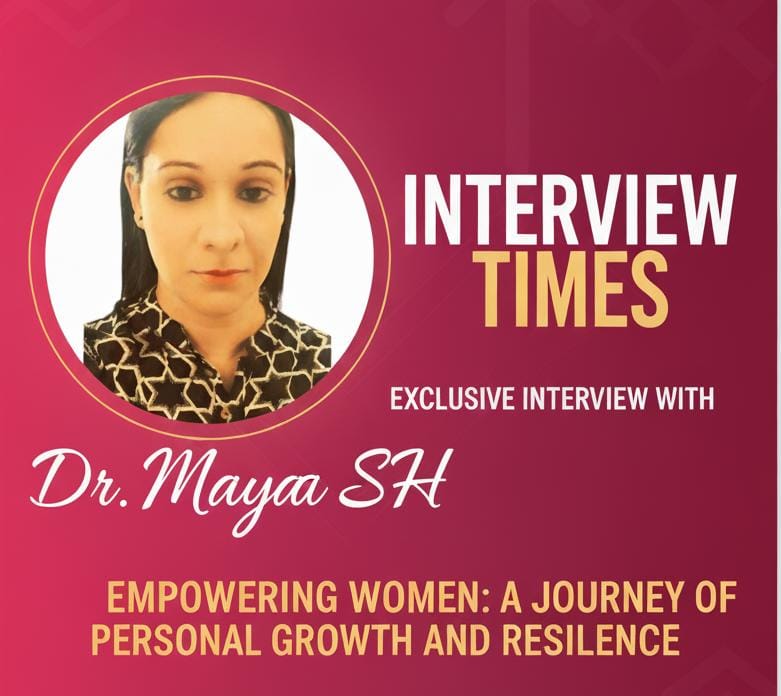Dr. Mayaa SH is a distinguished author, empowerment culturist, and advocate for gender equality whose profound work has inspired millions across the globe. Known for her influential book Swayam, she champions the principles of self-belief, resilience, and personal growth, especially for women seeking to reclaim their strength and independence. Her writings beautifully weave together introspection, motivation, and the power of an exponential growth mindset — drawing inspiration from trailblazers who have redefined success.
Beyond literature, Dr. Mayaa SH’s influence extends into social activism and mental health advocacy. A strong voice for women’s rights, she is widely recognized as a “Firebrand Feminist,” “Women Empowerment Culturist,” and “Gender-Based Violence Specialist.” Her unwavering efforts toward suicide prevention, countering depression, and raising awareness about mental well-being have earned her numerous national and international accolades.
As a Legal Advisor on Matrimonial Law, Dr. Mayaa SH works tirelessly to guide individuals through emotional and legal challenges with empathy and expertise. Featured in prestigious publications such as Tejaswi – The Imperishable on Women Power and Honour, she continues to shape conversations on equality, justice, and self-worth, standing as one of India’s most impactful voices for empowerment and transformation.
Your book Swayam has received global recognition for its message on self-belief and growth. What inspired you to write it, and what core message do you hope readers take away?
Answer: My inspiration for writing Swayam stems from a profound desire to explore the complexities of human emotions, particularly those surrounding self-discovery, resilience, and the pursuit of inner peace amidst life’s challenges. I aimed to craft a narrative that resonates with readers on a deeply personal level, encouraging introspection and a re-evaluation of their own journeys. The core message Swayam as a book hopes for the readers as a take away is the importance of embracing one’s authentic self, navigating adversity with courage, and ultimately finding strength and solace within. This message is woven throughout the narrative, highlighting the transformative power of self-acceptance and the continuous process of personal growth.The inspiration for Swayam also draws from my observations and experiences of individuals who face societal pressures and the often-unspoken struggles individuals face in conforming to external expectations.I endeavoured to create a space where these internal conflicts could be openly addressed, offering a sense of validation and understanding to those who might feel isolated in their experiences. Through the protagonist’s journey, the book illustrates that true liberation comes from shedding societal masks and embracing one’s unique identity, flaws and all. The narrative thereby encourages readers to embark on their own paths of self-discovery, emphasizing that this journey is not always linear but is ultimately rewarding.The overarching theme is one of empowerment, urging individuals to reclaim their narratives and define their own versions of success and happiness, independent of external validation.
You often emphasize the “exponential growth mindset.” How do you define it, and how can individuals cultivate this mindset in their personal and professional lives?
Answer: To cultivate an exponential growth mindset in personal and professional lives, I emphasize upon several key strategies such as focusing on continuous learning, embracing challenges, and leveraging technology and innovation. Individuals should actively seek out new knowledge and skills, viewing obstacles as opportunities for development rather than insurmountable barriers. This involves a shift from a fixed mindset, where abilities are seen as static, to a growth mindset, where they are perceived as malleable and capable of improvement through effort and dedication.My mindset and approach lies in encouraging all to foster an exponential growth mindset involves several actionable steps. Firstly, it’s crucial to develop a strong sense of self-awareness and regularly reflect on one’s strengths and areas for improvement. This introspection allows individuals to identify limiting beliefs and actively work towards reframing them into empowering thoughts. Besides, I do advocate for setting ambitious, yet achievable, goals that push individuals beyond their comfort zones. These goals should be broken down into smaller, manageable steps to maintain momentum and celebrate progress along the way.
Your advocacy work in suicide prevention and mental health is widely respected. What motivated you to dedicate yourself to this crucial cause?
Answer:The prime motivation for me to dedicate myself in advocacy work for suicide prevention and mental health was fueled by a recognition of the pervasive stigma surrounding mental health issues and the critical need for increased awareness and accessible support systems . I did observe the results or outcomes of firsthand the devastating consequences of untreated mental health conditions and the silence that often prevents individuals from seeking help . Thus,I decided to champion my work to be driven by a desire to break down these barriers, foster open conversations about mental well-being, and ensure that individuals struggling with suicidal ideation receive the timely and compassionate care they need . I did look at initiatives that promote mental health literacy, early intervention, and the development of robust support networks, aiming to create a society where mental health is prioritized and individuals feel empowered to seek assistance without fear of judgment.I did witness the personal battles of countless individuals against mental health challenges, which provided me with the insights into the complexities and isolation often associated with these conditions . This direct experience fueled my empathy and determination to speak out, transforming the personal struggles of many into a powerful platform for advocacy to primarily remove pervasive stigma and the lack of adequate support systems that prevent many individuals from seeking help.
As a Gender-Based Violence Specialist, what are the most pressing challenges women face today, and how can society better support survivors?
Answer: There are several critical challenges women face globally, with gender-based violence (GBV) in its various forms remaining a pervasive and deeply entrenched issue. This encompasses physical, gender based violence ,intimate partner violence (IPV), psychological, domestic and economic violence, often exacerbated by conflict, climate change, and digital spaces . Economic inequality and lack of access to resources, including education, healthcare, and financial independence, continue to hinder women’s empowerment and increase their vulnerability to exploitation and abuse . Furthermore, the erosion of reproductive rights in certain regions and the persistent digital gender divide, which limits women’s access to technology and exposes them to online harassment, are growing concerns . Political underrepresentation and the backlash against women’s rights movements also present significant obstacles to achieving gender equality .To better support survivors of gender-based violence, society must adopt a multi-faceted and survivor- centered approach. This includes strengthening legal frameworks and ensuring their effective implementation to prosecute perpetrators and protect survivors . Crucially, there needs to be increased funding and accessibility for comprehensive support services, such as safe shelters, psychological counselling, legal aid, and economic empowerment programs, tailored to the specific needs of diverse survivor populations. Education and awareness campaigns are vital to challenge harmful gender norms, promote respectful relationships, and encourage bystander intervention. Furthermore, integrating GBV prevention and response into humanitarian aid and climate change adaptation strategies is essential, given the disproportionate impact of these crises on women and girls.Finally, fostering women’s leadership and participation in all spheres of society, from local communities to national policy-making, is fundamental to creating a more equitable and safer world for all .
Being a Legal Advisor on Matrimonial Law, how do you balance legal reasoning with emotional sensitivity in cases involving marriage and family disputes?
Answer: Balancing legal reasoning with emotional sensitivity in cases involving marriage and family disputes is paramount. This balance is achieved through a multi-faceted approach that integrates a deep understanding of legal principles with empathetic communication and client- centered strategies. The core objective is to navigate complex legal frameworks while acknowledging and addressing the profound emotional impact these disputes have on individuals and families.Matrimonial law, by its very nature, deals with deeply personal and often emotionally charged issues such as divorce, child custody, spousal support, and property division. Unlike other areas of law where the focus might be solely on financial transactions or contractual obligations, family law cases involve the dissolution of intimate relationships and the restructuring of family units. This necessitates a recognition that individuals are not merely legal entities but individuals experiencing significant life transitions, often accompanied by grief, anger, fear, and uncertainty.This includes understanding the criteria for divorce, the factors considered in child custody determinations (e.g., the “best interests of the child” standard), and the principles governing property division and spousal support.Application of Legal Principles to Facts is a must . Each case presents a unique set of facts. Legal reasoning involves meticulously gathering information, analyzing evidence (financial documents, communications, expert reports), and applying the relevant legal principles to these specific circumstances to formulate a sound legal argument.This might involve calculating potential spousal support using established formulas or assessing the division of marital assets based oncontributions and future needs.Developing a strategic plan, outlining potential outcomes, identifying strengths and weaknesses of the client’s position, and assessing the risks associated with various legal actions (e.g., litigation vs. settlement) is pivotal.This includes advising couples on the likelihood of success in court, the potential costs involved, and the long-term implications of different decisions.At the first level however, a marriage must be looked at an amicable resolve regarding conflicts , safeguarding interests of both the parties involved ,maintaining privacy of the factual information of the couple and a reasoning for mediation at the first go .
You are often described as a “Firebrand Feminist” and “Women Empowerment Culturist.” What do these titles mean to you personally, and how do they reflect your mission?
Answer :I view the titles “Firebrand Feminist” and “Women Empowerment Culturist” are deeply personal reflections of every woman’s unwavering commitment to challenging societal norms and fostering a culture of female strength and independence. These titles encapsulate my active and often provocative approach to feminism, distinguishing myself from more conventional advocates. This furthermore signifies my passionate, outspoken, and sometimes confrontational stance against gender inequality and patriarchal structures. It suggests a willingness to ignite conversations, challenge the status quo, and inspire radical change rather than incremental adjustments.This also aligns with my mission to not just discuss women’s rights but to actively campaign for them, often through direct and impactful communication.The title “Women Empowerment Culturist” further elaborates on my mission by highlighting my vision to cultivate and nurture an environment where women are not only “Empowered but also Celebrated for their Achievements and the potential around it.” This involves fostering a culture that values female leadership, creativity, and autonomy across various domains, including arts, business, and social activism.
Mental health remains a taboo topic in many parts of society. What steps do you believe are necessary to normalize open conversations about mental well-being?
Answer: My mindset and philosophy is placed at an advocacy for a multi-faceted approach to normalize open conversations about mental well-being, emphasizing the need for societal shifts and individual actions. Hence,the recommendations centre on fostering environments where discussing mental health is as commonplace as physical health, thereby reducing stigma and encouraging help-seeking behaviours .I do believe that normalizing open conversations about mental well-being requires a combination of education, destigmatization, and the creation of supportive environments. It is imperative to lay emphasis on the importance of integrating mental health education into curriculum from an early age, promoting media representation that accurately and sensitively portrays mental health challenges, and encouraging influential figures to share their own experiences to break down barriers .Furthermore, there is a dire need to stress upon the need for accessible and affordable mental healthcare services, ensuring that individuals who do open up about their struggles can readily find professional support .I also highlight upon the role of workplaces and communities in fostering a culture of empathy and understanding, where open dialogue about mental well-being is not only accepted but actively encouraged . This includes implementing mental health first aid training and creating safe spaces for individuals to share their experiences without fear of judgment or discrimination .Ultimately, my vision involves a societal transformation where mental health is recognized as an integral part of overall health, leading to a more compassionate and supportive world.
Your work has earned you numerous awards and international recognition. Which of these milestones holds the most meaning for you, and why?
Answer: The achievements of my World Records are very special to me . While being an extremely private individual I do discourage wide publicity around achieving global recognitions ,unique accomplishments and impact,this is so to allow me the zeal to further keep moving forward to excel . This type of understanding often involves to encourage all women for extraordinary feats in performance, endurance, or a specific category, setting every woman apart in the international ,national and state arena. Furthermore, milestones promoting cultural exchange through music,art and literature often participation in international collaborations and festivals that bridge diverse aesthetic traditions are very special to me. My involvement in such initiatives not only expands to reflect upon the fact that any woman can have a global reach but also contribute to a broader understanding and appreciation of different art forms as well.This highlights encompassing both critical acclaim and ground breaking accomplishments for any woman in the world .
As someone who has inspired countless individuals, what advice would you give to young women struggling with self-doubt and societal pressures?
Answer: At an individual and professional level my comprehensive advice to young women navigating self-doubt and societal pressures is one centered around fostering inner strength, embracing individuality, and challenging external expectations. I do emphasize the importance of self-acceptance and resilience in the face of adversity .This is to young women to firstly dive inward and to recognize their inherent worth, independent of societal validation, and to cultivate a strong sense of self-identity. Thus ,I do frequently speak about the need to develop a “thick skin” against criticism and to prioritize personal well-being over conforming to unrealistic standards .My recommendation to young women to cultivate self-awareness, embrace their unique strengths, and actively challenge societal norms that contribute to self-doubt. Besides ,I do advocate for building resilience, seeking supportive communities, and prioritizing mental and emotional well-being above external validation. This is so to stress upon the importance of understanding one’s own values and goals, rather than passively accepting those imposed by others .
Looking ahead, what are your upcoming goals or projects, and how do you envision expanding your impact in literature, mental health, and women’s empowerment?
Answer: My overarching goals consistently revolve around leveraging storytelling for social good, fostering mental well-being, and championing gender equality.I do intend to engage in more literary workshops and mentorship programs, aiming to nurture emerging writers and promote diverse voices in literature.This involvement in literary festivals and speaking engagements is also anticipated to increase, providing platforms to discuss the power of storytelling and its role in societal change.In the realm of mental health, all endeavours are furthermore going to center on destigmatizing mental illness and promoting accessible mental health resources. This shall involve expanding existing campaigns or launching new initiatives focused on specific demographics, such as youth or marginalized communities. As I have previously also emphasized the importance of early intervention and creating supportive environments. Therefore, collaborations with mental health organizations, educational institutions, and policymakers are probable, aiming to integrate mental health literacy into mainstream education and public discourse.The development of digital platforms or resources offering guidance and support for mental well-being is also a strong possibility, given the increasing reliance on technology for health information.I aim to expand mentorship programs for women, providing guidance and support for their professional and personal growth. Collaborations with non-governmental organizations and international bodies focused on women’s rights are also anticipated, aiming to influence policy changes and create more equitable societies.My future works are expected to deepen this integration through several key approaches, focusing on nuanced character development, exploration of societal challenges, and advocacy for systemic change. I do aim to portray women not merely as victims or heroes, but as simple individuals navigating in complex and diverse circumstances, highlighting their resilience, agency, and intellectual contributions . This includes showcasing women in leadership roles, challenging traditional gender stereotypes, and exploring the psychological depth of female experiences.
- Height Restrictions Imposed on Buildings Near Ram Mandir to Preserve Temple’s Grandeur
- Rashtriya Pratibha Samman for Poetic Excellence awarded to Author Tushar Kiran Moodgal
- Cinebuzz- Batla House Movie Review
- Unveiling the Corporate Odyssey: An Insightful Conversation with Author Harish C. Rijhwani on his Latest Release “9 to 5 Cubicle Tales – A Race Against Time”





